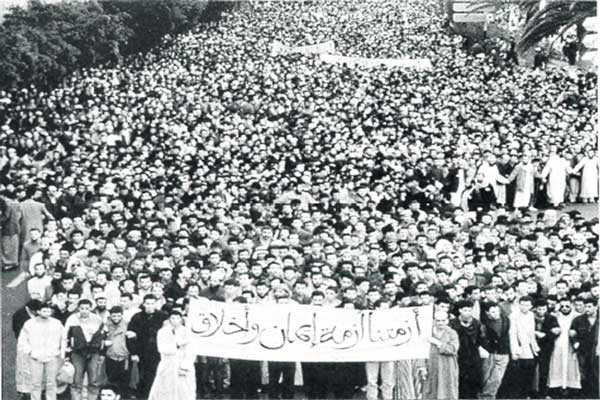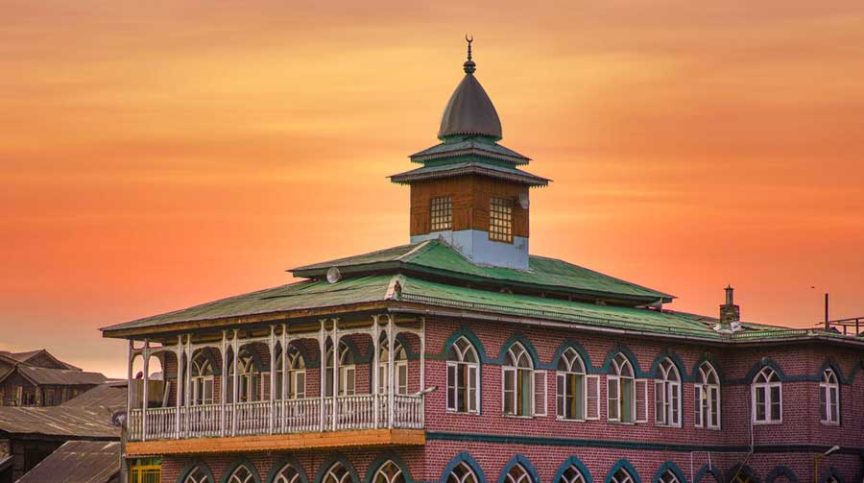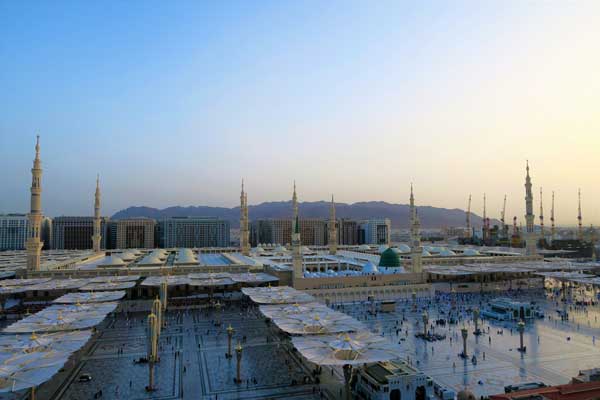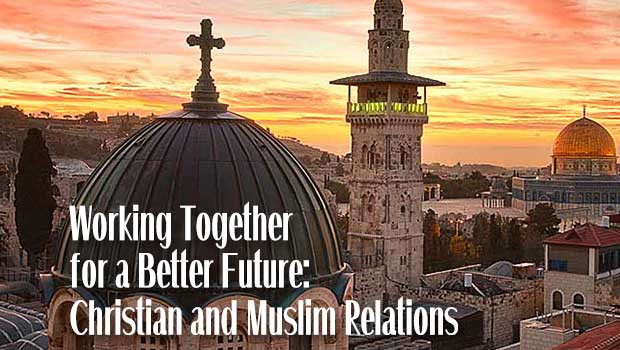Many People, secularists and Islamists alike, were stunned by the results of the Algerian election of June 12, 1990. A previously unknown Islamic party, Al-Jabhatu al-Islamiyyatu Lil’inqadh, or Islamic Salvation Front (better known by its French acronym F.I.S.), shocked political observers inside and outside the country by sweeping a clear majority of the votes in local and provincial elections, thus defeating the ruling National Liberation Front (F.L.N.) party, which governed Algeria for nearly three decades. The victory becomes even more intriguing if one notes that the F.I.S. was only legalized in October 1989, and had only 10 months to prepare for the elections. During this time the F.L.N. had a monopoly on all the means of propaganda, such as the national TV and all major newspapers.
But on the other hand, the triumph did not come about in a vacuum. It was rather the fruit of years of silent and hard work by sincere Muslims who wanted Islam restored to the Algerians’ lives.
In order to understand Algeria, it must be kept in mind that although it is perceived as a secularized and Westernized country in the Arab world, its popular tradition is still based on Islamic values. So, when officially gagged and ostracized Islamists win the day in an election, it should only serve to highlight the battle that has been dragging for almost two centuries between the forces of Islam and the might of the West’s stooges. This battle of Westernization that started with the weakening of the ottomans in the early 1800s, and the subsequent fall of Algeria under the French occupation in 1830, is still being fought. And although the French were physically ousted from Algeria about thirty years ago, the ideological battle continues. Algerian Muslims have never given up hope for the triumph of Islam no matter how long it might take. A quick tracing of major historical events takes us to Emir Abdulkader, who organized the Muslim resistance, and proclaimed Jihad against the French from 1832 until his capture in 1847. To Al-Mokrani, who in 1871 reorganized the resistance and for a long time followed the footsteps of the Emir until his death. Continuing the battle in 1931, one year after France celebrated the one hundredth anniversary of its occupation, Abdulhamid Ibn Badis founded Jamiyyat al- Ulamaa al-Muslimeen al- Jaza’iryylin, or the Association of Algerian Muslim Scholars (AAMS). The goal of the association was threefold: (1) to reform the Algerian Muslim personality by restoring the people’s self-confidence which was savagely damaged by occupation, (2) to convince the people that only through Islam could they regain their freedom and break the chains of colonization, and (3) to fight the established “French-Islam,” a mystic order that was prevailing and nourished by the occupying forces to keep dominance over the Ummah. This was the type of Islam that preached occupation to be a “Qadar’ from Allah, and thus erasing the concept of jihad from people’s mind. Ibn Badis was an uncompromising man when it came to dealing with the enemy. He is reported to have once stated: “if France told me that there is no God but Allah, I would not have believed her.” The Association that Ibn Badis founded had a major impact, and was quite successful in its task. The methods it adopted are still being used by contemporary Islamists in Algeria, and might be the main reason on recent success.
The Association of Muslim scholars was the driving force behind the 1954 popular revolt that brought independence to the country, although the fruits were later stolen by secularists. For example Alistar Horne, a British historian who wrote about the Algerian war, testified that although they were not the first in the field, it was probably the Scholars (Ulamaa) that provided the nationalists with their first momentum, that their philosophic influence was of primary and inestimable significance, even remaining very much a force in present day Algeria, that Ibn Badis was an ascetic and deeply conservative theologian who believed that Algerian regeneration could only be achieved by a return to the basic principles of Islam. In tackling the issue of Algerian identity, Ibn Badis authored the popular slogan: “Islam is a Deen, Arabic is our Language, and Algeria is our nation.” In reply to calls by Algerian Francophones for merging and assimilating within the French nation on the basis that Algeria never existed (calls popular at that time due to an identity crisis), Ibn Badis replied: “We have examined history, and indeed discovered a Muslim Algerian nation which has its culture, its traditions and its characteristics, good or bad like any other nation on the earth. And next, we state that this Algerian nation is not France, cannot be France, and does not wish to be France.” Alongside Ibn Badis were prominent scholars that should be remembered for their struggle. Amongst these were: Taibi al-Uqbi, Mubarak al-Mili, Fudheel al-Wurtulani, Bachir al-Ibrahimi, Abdullatif Soltani, and Ahmed Sahnoun. This last one, is the only surviving personality of Ibn Badis’ time, and is the senior Islamic scholar of today’s Algeria who enjoys wide respect among Algerians. Last year he founded the League for Islamic Da’wa, intended to be the umbrella organization for all Islamic groups, including the F.I.S. After a long and bloody struggle, independence was gained in 1962, but only to be confiscated by secularists. Following bitter internal conflicts, Ahmad Ben Bella was brought to power. What must go down as the national tragedy, Ben Bella dismantled and banned AAMS under the pretext that its mission was completed and did not have a raison d’etre anymore. He also put under house arrest Bachir al-Ibrahimi who was its president at the time. Al-Ibrahimi later died under arrest in a hospital in Algiers, the capital. During his short rule, Ben Bella tried to enforce his socialist dogma, and originated the one-party dictatorship. Sheikh Mahfouz An-Nahnah, a politically active Islamic scholar, once reported that the man mixed his blood with that of Fidel Castro in a symbolic brotherhood of the socialist-marxists. Ironically this is the same Ben Bella who is denouncing the one-party dictatorship that he himself installed, and whose failures emboldened army colonels to capture power in 1965. He is being presented today as the “historical figure,” the man of compromise, who can save the country. Nothing could be further from the truth.
After a short rule, Ben Bella was ousted in a military coup that brought Houari Boumedienne to power. From 1965 to 1978, Boumedienne reinforced the one-party system, and provided the ruling F.L.N. with a power to dominate every aspect of Algerian life. A benign picture of Algeria was painted to the outside world, while dissent was mercilessly suppressed inside. He went on with a full-fledged Soviet-style planned economy and collective farming. Although it was a period of relative economic prosperity (oil was $36 a barrel), a large part of that wealth was used to cover miserable failures in other sectors of the economy, and mostly agriculture. Waste and corruption were at their peak.
For Islamists these were difficult times. In the footsteps of Jamal Abdul Nasser, Boumedienne hit hard on Islamic activists, driving many into hiding until his death in 1978. Among these was Mahfouz An-Nahnah, who was given a life sentence for opposing Boumedienne’s National Charter that was drafted in 1976. This period was also marked by a strong underground Islamic movement that taught the activists efficiency and secrecy in conducting da’wah.
After Boumedienne’s death in 1978, Chadli Benjedid came to power, and a relative freedom came to be enjoyed in Masajid. The situation in Algeria since 1980 can be described as follows:
1980-1988
Relative freedom in Masajid was enjoyed, and the Islamic da’wah was conducted more openly. In speeches and Khutabas, open criticism of the regime and socialism became more frequent. This period also witnessed some violent activities against Islamists by Boumedienninsts. Many people were thrown into jails. Abbasi Madani, along with other Muslims, publicly challenged the regime and asked it to release Muslims. Instead, he too was thrown into jail for a while. Errors and serious failures of socialist policies became more acute. Serious economic repercussions became evident, creating unemployment and total discontent.
Since October 1988
Popular revolt broke out that almost toppled the regime. The army fired on demonstrators killing more than 500. Islamic “Fundamentalists” were blamed for instigating the riots. President Chadhi Benjedid, shocked by street protests, agreed to amend the constitution and abolish the one-party system, allow freedom of the press and radical reforms, shift socialist economy towards free-market and send the army back to the barracks. Soon many groups came forward and asked for an official recognition of their parties. The government was reluctant but gave in.
In mid-1989 the Islamists formed the Islamic Salvation Front, and Benjedid had to recognize it under intense street protests.
The F.I.S. includes Islamists of many views and approaches, but not all Islamic forces. For instance Sheikh An-Nahnah, called it a premature move, and exhorted Muslims to be more cautious until things became clear. Unconcerned, Abbasi Madani went ahead with the work of structuring and organizing his party and its platform.
Things started moving too fast and beyond the government’s expectations. Sheikh An-Nahnah moved to form Jamiyat al-Islah wal-Irshad, or the Association for Reform and Guidance.
A situation of political chaos seemed to emerge as a result of the formation of nearly 25 political parties within a year. As time passed, only the strongest remained in the field. The streets started to resonate with ideological clashes. Soon Algeria saw, among other things a rally by secular-Westernized women demanding abolition of the Family Code, which they thought was judged too Islamic and against modern time and aspirations of women in the 20th century. The rally which brought 700 people, was backed by several secular parties and organizations. On the heels of that rally came a call by Islamic leaders for pro-Islamic Women of Algeria to speak up and show the world that they are the representatives of their country. The world was stunned by a 700,000 strong demonstration. A list of demands was given to the parliament. Political analysts concluded that the question of women in Algeria had been answered with the overwhelming showing of the pro-Islamic women.
The ruling party planned a counter demonstration, but retreated because of a lack of support. Its weakness became more and more evident. Some desperate moves were attempted by the F.L.N., including a motion in parliament to ban the use of mosques.
The Long Road to Victory
The Islamic victory in provincial and local elections results from a concerted effort on the part of Islamic leaders who have persevered in adversity. It also stems from the miserable failure of all ideologies. A country which is striving for spiritual, social and economic direction, responded to Abbasi Madani’s slogan that “Islam is the solution.” It is not true, as some misguided people charge that people chose Islam in revenge for the failures of the secular ruling party. People had other choices that they could opt for. Those who boycotted the elections did so because they knew they could not beat the Islamists. By such a boycott, they think they have saved their honor and achieved political survival.
What’s Next?
The secularists are not the only ones to be sad over an Islamic victory. There are also the Western planners and enemies of Islam. This victory is a rejection of Western and secular values, which were implanted in the heart of a Muslim Arab country and reinforced by colonial masters and their stooges.
The enemies of Islam are not likely to give up so easily. There are already signs that they are trying to instigate trouble and give an excuse to military to take over. This possibility is already being talked about in the French media. It is also that external foes of Islam would impose an economic blockade against a future Islamic government of Algeria.
This is a critical time for Algeria’s Islamists. While they have won provincially and locally, they cannot be effective without capturing power at the national level. If elections for the national parliament – which are controlled by F.L.N. – were to be held today, the Islamists would surely win. As the government knows this too well, the Islamists have to demand parliamentary elections tactfully and without sounding a threat to their opponents.





